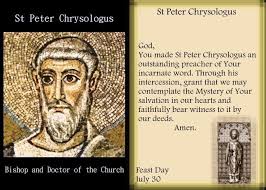HOMILY WEEK 17 05 – Year II
Called to do Metanoia:
Memorial of St. Peter Chrysologus
(Jer 26:11-16, 24; Ps 69; Mt 14:1-12)
*****************************************************
“Now therefore, amend your ways and your doings, and obey the voice of the Lord your God…”
Today’s liturgy invites us be prophetic – to speak the truth of repentance, to do metanoia and call others to conversion.
The prophet Jeremiah fearlessly confronted the Israelites, preached repentance to them, called them to amend their ways, and to obey the voice of the Lord their God. For that he was condemned to death by “the priests and the prophets,” those most invested in the self-serving religious system they had constructed in collusion with the occupying Romans. As it is today, so often it is the whistle-blower, the one who courageously points out wrong-doing and injustice, who is unfairly victimized and blamed.
Jeremiah stands his ground, however, and insists it is the Lord who put those precise words in his ears. Interestingly, there is a sudden shift in tone and mood – a conversion of minds and hearts in at least the officials and the people, who protest that unjust ruling of a death sentence, so Jeremiah’s life is spared.
What caused such a change of heart? It would have to be the Holy Spirit who helped them accept that Jeremiah’s cutting message had indeed come from the heart of God. It was the Spirit who helped them change their course of action.
That’s how the Holy Spirit wants to help us today. The Spirit can change our hearts in unexpected ways, just as she did for the ancient Jews. She can catch us just as we’re about to share in some gossip, and urge us to stay quiet. She can help us see a difficult family member with new eyes. She can remind us that it has been a few days since we prayed.
We may feel some unrest or tension about something today. We may have a nagging sense God wants us to think differently about a decision facing us. The Spirit wants to help us think with the mind of Christ today. How does this happen?
There is no one-size-fits-all formula, but it always helps to get in the habit of slowing down and listening for the quiet voice of the Spirit when we are feeling unsettled, especially through contemplative prayer. We can take a few moments to ask if our thoughts reflect the character of Jesus, of if there is something he wants to say to us. It doesn’t take long, and we need not expect the heavens to part every time we do this. But over time, we’ll get used to hearing the Spirit’s gentle voice, and we’ll find the grace we need to follow the Spirit’s lead.
In the gospel, John the Baptist, like his ancestor Jeremiah, preached repentance to King Herod, who out of false pride and fear, refused to repent, to change his mind, and had John beheaded to please his wife and her daughter. It is interesting that my ordination to the episcopacy on August 29th 2005 happened to be on the feast of the beheading of John the Baptist – not something we wanted to highlight at that particular event! The prophetic message is to repentance – a turn of 180%, change, conversion. It can be hard to accept, and dangerous when not accepted.
But there is more to the word “repentance” than just changing behavior. Ron Rolheiser, in a meditation entitled From Paranoia to Metanoia, claims “it’s significant the first word out of Jesus’ mouth in the Synoptic Gospels is the word, metanoia. Jesus begins his ministry with these words: ‘Repent [metanoia] and believe in the good news’ and that, in capsule, is a summary of his entire message.”
The word, metanoia, comes from two Greek words: Meta, meaning above; and Nous, meaning mind. Metanoia invites us to move above our normal instincts, into a bigger mind, into a mind which rises above the proclivity for self-interest and self-protection which so frequently trigger feelings of bitterness, negativity, and lack of empathy inside us.
Metanoia invites us to meet all situations, however unfair they may seem, with understanding and an empathic heart. Moreover, metanoia stands in contrast to paranoia. In essence, metanoia is “non-paranoia”, so that Jesus’ opening words in the Synoptic Gospels might be better rendered: Be un-paranoid and believe that it is good news. Live in trust!”

Today, the Church invites us to honor St. Peter Chrysologus. Peter, born in Italy around 406, became Archbishop of Ravenna about 439. When he arrived in his diocese, he found a strong pagan influence and many lapsed faithful. Through his labors, paganism was eradicated and the faith revived. He was a concerned pastor and preacher and earned the title Chrysologus (“of golden words”) because of his inspirational homilies, many of which are still extant. He died around 450 and was made a Doctor of the Church in 1729.
The Eucharist is spiritual food for all – priests, prophets, officials and people, and a call to do metanoia – to repentance, especially within the penitential rite, and transformation, especially through the Word of God and communion with the Body and Blood of Jesus himself.
We who hear the truth in God’s Word, receive that truth in communion, and respond to that truth by conversion, metanoia, are then called to live it out in our actions, especially each in our own way calling others to conversion.



